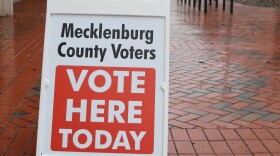Democrats in the North Carolina General Assembly claim a Republican-backed bill that its sponsors say would bolster election integrity would do the opposite.
The bill introduced last week by the leaders of the Senate’s elections committee would add new regulations to early voting and absentee ballots.
"One of these parties values robust involvement in democracy," said Sen. Dan Blue, the top Democrat in the state Senate, referring to the GOP-backed elections bill. "The other values raw power."
Blue and other Democrats from the state House and Senate addressed reporters on Monday.
Under the proposed legislation, voters using same-day registration at early voting sites would have to use a provisional ballot, which could later be challenged or thrown out. And mail-in ballots would have to be received by the close of polls on Election Day, eliminating a three-day grace period for accepting absentee-by-mail ballots that are postmarked by Election Day.
"It's not fair to let the speed of the U.S. Postal Service determine whether your vote counts," said state Sen. Natasha Marcus, D-Mecklenburg.
"You can't control, as a voter, how long it takes them to deliver your ballot, sometimes from hundreds of miles away," Marcus added. "Postal delays, natural disasters, they do happen and they will impact the speed of delivery and those should not be reasons to deny voters their right to vote and be heard at the ballot box."
Marcus and fellow Democrats also noted that federal election law requires a grace period for counting absentee ballots from military personnel and other citizens living overseas.
“Making Election Day the official deadline removes confusion and skepticism from the minds of voters,” Sen. Paul Newton, R-Cabarrus and one of the bill’s sponsors, said in a news release after the GOP bill was filed. “It will make for a quicker declaration of winners, it aligns us with 30 other states, and it helps North Carolina move past each election cycle with confidence, instead of doubt.”
“It would be in the best interest of all North Carolinians if Democrats stop pushing false, inflammatory rhetoric and instead join Republicans in strengthening the integrity of our elections," said Randy Brechbiel, a spokesman for Senate President Pro Tem Phil Berger's office, responding to a WUNC request for comment after the Democrats held their news conference.
Democrats like Rep. Robert Reives, the House Minority Leader, say it's Republicans who are promoting a false narrative when they push legislation like this amid unfounded claims from the hard right that election integrity is endangered by voter fraud.
"I can't understand, just as my colleagues have said, why we'd be doing this at this point in time," Reives said of the Republican-backed bill, which would require the State Board of Elections to use signature verification software to validate absentee ballots and would require courts to furnish the elections board with the names of people disqualified from jury service because of their citizenship status.
"When, especially after January 6th [2021], we should be doing everything we can to give people confidence in our governmental systems," Reives added. "And what we're doing is continuing to make people question the very government that they're in."
Democrats and voting rights advocates are especially concerned that Republican lawmakers have met with Cleta Mitchell ahead of filing their elections bill.
Mitchell, an attorney and conspiracy theorist who lives in North Carolina, is infamous for playing a role in trying to get Georgia elections officials to unearth enough votes for Donald Trump to overturn the legitimate outcome of the 2020 presidential election.
Democrats noted that Republicans, who hold a veto-proof majority in both chambers of the General Assembly, have proposed legislation that would block North Carolina from joining ERIC, the Elections Registration Information Center. ERIC is a multi-state consortium through which members share information and data on the movement and deaths of voters. Republicans like Brad Raffensberger, Georgia's Secretary of State, have touted ERIC as the best tool around for states to maintain clean voter rolls.
Republican state lawmakers approved funding last year for North Caroling to join ERIC only to turn around this year amid a partisan misinformation campaign by archconservatives to disparage the organization as serving liberal interests. One major objection to ERIC among Republicans is the requirement that member states automatically notify voting-age residents of their eligibility to register.
Sen. Warren Daniel, a top Republican and primary sponsor of the new elections bill, recently told WUNC that ERIC's automatic notification provision would be costly for North Carolina.
"Somehow, it has become a radical idea to encourage people to vote," Sen. Blue wryly said, criticizing Republicans' turnaround on ERIC.
But there seems to be little standing in the way of Republicans passing their bill. With their super-majority, GOP lawmakers can override gubernatorial vetoes without the help of Democrats. And Republican justices hold a majority on the state Supreme Court, a majority that recently reversed a previous court's ruling that GOP-drawn district maps were unconstitutionally gerrymandered for excessive partisan gain.
But Rep. Reives, the Democrats' leader in the State House, told reporters he hopes the Republican initiatives to change election law will be challenged at the ballot box.
"I'm hoping that people will wake up and just say 'We've had enough.'"
After its formal introduction in the Senate on Monday, the new bill will now go through the committee process.
WUNC's Colin Campbell contributed to this report.







